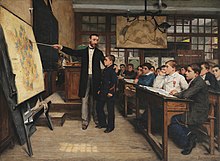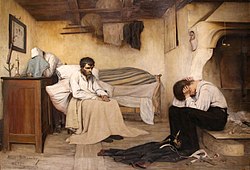"The Black Stain" redirects here. For the mysterious Venezuelan substance, see La Mancha Negra. For other uses, see Black spot.
| Albert Bettannier | |
|---|---|
| Born | (1851-08-12)12 August 1851 Metz, France |
| Died | 17 November 1932(1932-11-17) (aged 81) Paris, France |
| Known for | Painting |
Nicolas Albert Bettannier (12 August 1851 – 17 November 1932) was a French painter in the era of the French Third Republic.
Life

Bettannier was born in Metz in 1851 the son of Jean Bettannier and Marie Bellatte. He studied in the Moselle department. After the ceding of his native region Alsace-Lorraine to Germany following the French defeat in the Franco-Prussian War of 1871, he decided to keep his French nationality and moved to Paris. He enrolled in the Académie des beaux-arts where he followed courses given by Henri Lehmann and Isidore Pils. From 1881 onwards, he acquired some notoriety in the Salon des artistes français, where he frequently showed paintings depicting the loss of Alsace-Lorraine to Germany. He was a fierce proponent of French revanchism. The loss of Alsace-Lorraine was a recurring theme in his work.
Albert Bettannier was awarded the Legion d'honneur in 1908 for his work as a painter.
He died on 17 November 1932 and is buried at Vaugirard Cemetery in Paris.
Work
- La Tache noire (The Black Spot), Deutsches Historisches Museum, Berlin, 1887
- Le désespoir (The Despair), Musée de l'Ermitage, Saint-Pétersbourg, 1893
- La Conquête de la Lorraine (The Conquest of Lorraine), 1910
- L'Oiseau de France (The Bird of France), 1912.
Gallery
-
 The Black Spot or The Geography Lesson, 1887
The Black Spot or The Geography Lesson, 1887
-
 Le Désespoir ou Les Annexés en Lorraine, 1883
Le Désespoir ou Les Annexés en Lorraine, 1883
-
 Les Annexés en Alsace, 1911
Les Annexés en Alsace, 1911
-
 The Bird of France, 1912
The Bird of France, 1912
-
 Enchères à l'Hôtel Drouot, 1921
Enchères à l'Hôtel Drouot, 1921